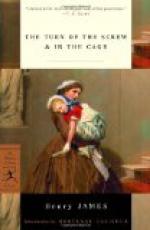But she could none the less, even after a month, scarce have told if the gentlemen who came in with him recurred or changed; and this in spite of the fact that they too were always posting and wiring, smoking in her face and signing or not signing. The gentlemen who came in with him were nothing when he was there. They turned up alone at other times—then only perhaps with a dim richness of reference. He himself, absent as well as present, was all. He was very tall, very fair, and had, in spite of his thick preoccupations, a good-humour that was exquisite, particularly as it so often had the effect of keeping him on. He could have reached over anybody, and anybody—no matter who—would have let him; but he was so extraordinarily kind that he quite pathetically waited, never waggling things at her out of his turn nor saying “Here!” with horrid sharpness. He waited for pottering old ladies, for gaping slaveys, for the perpetual Buttonses from Thrupp’s; and the thing in all this that she would have liked most unspeakably to put to the test was the possibility of her having for him a personal identity that might in a particular way appeal. There were moments when he actually struck her as on her side, as arranging to help, to support, to spare her.
But such was the singular spirit of our young friend that she could remind herself with a pang that when people had awfully good manners—people of that class,—you couldn’t tell. These manners were for everybody, and it might be drearily unavailing for any poor particular body to be overworked and unusual. What he did take for granted was all sorts of facility; and his high pleasantness, his relighting of cigarettes while he waited, his unconscious bestowal of opportunities, of boons, of blessings, were all a part of his splendid security, the instinct that told him there was nothing such an existence as his could ever lose by. He was somehow all at once very bright and very grave, very young and immensely complete; and whatever he was at any moment it was always as much as all the rest the mere bloom of his beatitude. He was sometimes Everard, as he had been at the Hotel Brighton, and he was sometimes Captain Everard. He was sometimes Philip with his surname and sometimes Philip without it. In some directions he was merely Phil, in others he was merely Captain. There were relations in which he was none of these things, but a quite different person—“the Count.” There were several friends for whom he was William. There were several for whom, in allusion perhaps to his complexion, he was “the Pink ’Un.” Once, once only by good luck, he had, coinciding comically, quite miraculously, with another person also near to her, been “Mudge.” Yes, whatever he was, it was a part of his happiness—whatever he was and probably whatever he wasn’t. And his happiness was a part—it became so little by little—of something that, almost from the first of her being at Cocker’s, had been deeply with the girl.




